Edie Melson's Blog, page 94
March 28, 2023
We Shouldn't Let These 13 Things Hold Us Back From Writing Success
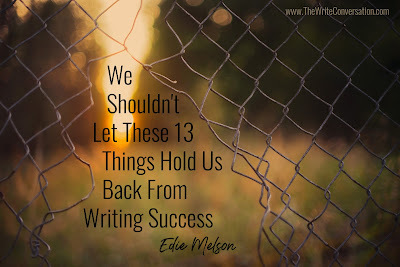
by Edie Melson @EdieMelson
Choosing to be a writer can be a daunting prospect. It involves courage, creativity, and yes, commitment. When we’re unwilling to make that commitment, we can destine ourselves to failure before we’ve had a chance to succeed.
This post isn’t meant to beat anyone up, but rather to make us aware of some of the things holding us back on our writing journey.
13 Things Holding Us Back On My Writing Journey
1. I'm unwilling to write on a schedule. Notice I didn’t say write every day or write every morning. There are some who other commitments in addition to writing that make scheduling a daily writing time unreasonable. HOWEVER, we can all make a commitment to certain times during the week to write.
2. I'm unwilling to spend time writing. This seems like a no-brainer, but you’d be surprised at how creative writers can be when it comes to thinking up reasons not to write. Beyond that, you’ll find writing groups and gathers populated with scores of people who want to be writers, but have reasons why they can’t right now. The truth is we all have reasons in our lives not to take the time to write. It all boils down to priorities. We make time for the things that are most important.
3. I'm unwilling to invest in learning how to write. Talent is great, but that alone won’t get any of us to the top, or even very far above the bottom. We have to learn how to apply the talent we’ve been given. That means reading books and blogs as well as attending classes and conferences.
4. I'm unwilling or defensive about being critiqued. I’m still not the best about enjoying a good critique, but I’ve learned how to accept it. I thank the person critiquing me, and even if I don’t agree, I look it over and try to take what I can from it. Especially with in-person critiques I’ve learned that being defensive and trying to explain or justify is counterproductive.
5. I'm unwilling to join a writers group. There are those in the industry who disagree with me, but not many. I’ve found that for me, and the hundreds of writers I’ve worked with, that we’re all stronger together. We need others to encourage us along the way. We also need the perspective of those who’ve experienced what we’re going through.
6. I'm refuse to spend time reading. Our business is that of writing. How can we have perspective on the industry if we refuse to read what’s being written? Books are a valuable way to learn and polish our own writing.
7. I'm unwilling to learn the business of writing. There’s more to writing than just putting words on paper. We need to learn the language of the publishing industry. We need to learn the etiquette of the publishing industry. We need to learn the marketing and social media side of the business, and how things work.
8. I'm unwilling to be patient. Writing is a craft. It’s not something learned overnight. We often come into this business with something we’ve written and expect it to be publishable. That’s just not reasonable. A concert pianist can’t expect to be performance-ready before his first lesson, and neither can a writer.
9. I'm unwilling to submit my work. Yes we want to write with excellence. We need to do the best we can right now, but not let perfectionism get in the way of submission. There are two truths in this industry we each need to embrace:No matter how hard we try, we’ll never be perfect.No matter how much we revise the piece we’re working on now, the next one will be better.
10. I think everything you write is publishable. There are going to be some things we write that just don’t fit the market—any market. This doesn’t necessarily mean they’re bad. It could be the wrong time or place for such a piece. We need to know when to move on to the next thing.
11. I'm unwilling to accept advice. I don’t think we should accept every single piece of advice we receive. Likewise though, I don’t think we should ignore every single piece of advice we receive. When someone
12. I'm unwilling to stop looking at yourself as the exception to the rule. There are certain ways that things are done or not done in the publishing industry. There are also exceptions to almost every single instance. But there’s a reason they’re called exceptions. It’s because those specific set of circumstances rarely happen that way. It’s fine to dream and hoped, but we also have to be diligent, disciplined and do our part to make our dreams come true.
13. I look at every other writer as competition. There is plenty of work to be done. Especially as believers who write, God has room for each of us. We need to celebrate the successes of one another, share what we’re learning, and never gloat when things go well.
I’m sure this list could go on and on and on. I’m at the end for me, but I’d love to hear what you’d add. Be sure to leave your thoughts in comments section below.
Don’t forget to join the conversation!Blessings,Edie
TWEETABLEWe Shouldn't Let These 13 Things Hold Us Back From Writing Success, from @EdieMelson (Click to Tweet)
 Edie Melson is a woman of faith with ink-stained fingers observing life through the lens of her camera. No matter whether she’s talking to writers, entrepreneurs, or readers, her first advice is always “Find your voice, live your story.” As an author, blogger, and speaker she’s encouraged and challenged audiences across the country and around the world. Her numerous books reflect her passion to help others develop the strength of their God-given gifts and apply them to their lives. Connect with her on her WEBSITE, through FACEBOOK, TWITTER and on INSTAGRAM.
Edie Melson is a woman of faith with ink-stained fingers observing life through the lens of her camera. No matter whether she’s talking to writers, entrepreneurs, or readers, her first advice is always “Find your voice, live your story.” As an author, blogger, and speaker she’s encouraged and challenged audiences across the country and around the world. Her numerous books reflect her passion to help others develop the strength of their God-given gifts and apply them to their lives. Connect with her on her WEBSITE, through FACEBOOK, TWITTER and on INSTAGRAM.
Published on March 28, 2023 22:00
March 27, 2023
Dipping the Quill Deeper: The Importance of Time Out for Writers!
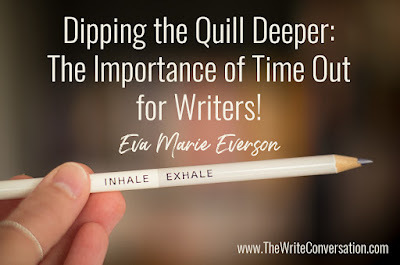
by Eva Marie Everson
“When you rest, you catch your breath and it holds you up, like water wings.” –Anne Lamott
I’m not sure how it happened, but somehow I overbooked myself. For six weeks, beginning in the month of February, I “met myself coming and going,” as the old saying goes. I found myself in entirely too many hotel rooms (or hostess guestrooms). Too many takeoffs and landings and sitting at crowded gates. Too many meals in restaurants.
In a six-week period, I had booked six events; the fifth was speaking at a Christian private school (so much fun!) while visiting friends in my hometown. During that five-day period, even though some work was involved, I took the time to simply “be.” To read. To enjoy conversations with friends while sitting around a blazing fire on a chilly morning with cups of coffee warming our hands. To peruse cute privately owned shops.
I also spent time with family—an oyster roast where the food was delicious, and the laughter tasted sweeter. A yummy-in-the-tummy lunch at a barbecue joint with a cousin.
On one sunny and warm afternoon during that week, I spent an hour sitting in the front of a Polaris, riding the foliage-filled trails that cut along and through a friend’s extensive property. At one point, I closed my eyes and breathed in the fresh air. “Take a break,” I whispered to myself. “Enjoy this. Don’t think about the work that is waiting for you. This is your time in God’s brushstrokes.” I followed that up with a single-line prayer: Thank you, Jesus.
Everyone needs time to rest. Time to breathe. Even Jesus “went away” from time to time, separating Himself from His disciples, those who followed Him, and His responsibilities to a short-lived ministry. He knew—and He understood—that without that time, He couldn’t do what He had to do without rest.
As writers and speakers and published authors we often live under deadlines. Even this blogpost was written in a “I’m on it” moment. Thinking I had missed my “day to post,” I texted Edie and asked, “Did I miss it?” She told me that, no, I had not, but it was coming up. “I’m on it!” I texted back.
Being under deadline or deadlines is good (without them, we have no work) . . . until it’s not. Once we become overwhelmed by our responsibilities—of work, of family, of social obligations—what we have to give diminishes. We. Need. Rest.
The book of Isaiah holds this warning: “This is the resting place, let the weary rest”; and “This is the place of repose”—but they would not listen (Isaiah 28:12 NIV).
But they would not listen . . . God grants us moments of rest, if we will only take them. God offers places of respose, if we will only look for them. We cannot give what we don’t have and once we pour everything out, there is nothing left to give. We. Must. Rest.
Work hard, yes. Do your best for Christ and the ministry He has given you, yes. But take a break.
Breathe.
Rest.
TWEETABLEDipping the Quill Deeper: The Importance of Time Out for Writers! from author @EvaMarieEverson on @EdieMelson (Click to Tweet)
 Eva Marie Everson is the CEO of Word Weavers International, the director of Florida Christian Writers Conference, and the contest director for Blue Ridge Mountains Christian Writers Conference. She is the multiple award-winning author of more than 40 books and countless articles and blogposts. She is also an award-winning speaker and a Bible teacher and the most recent recipient of the AWSA Lifetime Achievement Award (2022).
Eva Marie Everson is the CEO of Word Weavers International, the director of Florida Christian Writers Conference, and the contest director for Blue Ridge Mountains Christian Writers Conference. She is the multiple award-winning author of more than 40 books and countless articles and blogposts. She is also an award-winning speaker and a Bible teacher and the most recent recipient of the AWSA Lifetime Achievement Award (2022). Eva Marie is often seen at writers conferences across the States. She served as a mentor for the Jerry B. Jenkins Christian Writers Guild and taught as a guest professor at Taylor University in 2011. She and her husband make their home in Central Florida where they enjoy their grandchildren. They are owned by one persnickety cat named Vanessa.
Eva Marie's latest book, THE THIRD PATH, takes a look at 26 of the questions God asked in the Bible, then makes them personal to the reader. The premise of the book is currently her most asked for continuing workshop at writers conferences.
Published on March 27, 2023 22:00
March 26, 2023
Tips for Choosing Character Names for the Stories We Write
Ane Mulligan @AneMulligan
When William Shakespeare wrote Romeo and Juliet, one of the lines became quite famous: "A rose by any other name would smell as sweet." It’s now an adage and used in everyday speech. It's so renown one can merely quote the first part, and everyone knows the rest.
The adage may be true of flowers but not so much for characters in a book.
The other day, I saw a Facebook post by an author I admire. She was bemoaning the fact she had changed her main character's name six times and still didn't like it.
She's not alone. It's something that plagues a lot of writers, including me. My characters will not give up their secrets if I don't have their name right. They balk and refuse to cooperate. I've even had them blatantly tell me that isn't their name. Try explaining that to a normal (the name by which writers refer to non-writers).
My books all contain an ensemble cast of strong women helping each other through whatever life throws at them. But I have to be sure each is balanced with vulnerabilities, flaws, and quirks that suit them.
Along with my ensemble cast, I usually have a town or village population. Because I don't want too many names beginning with the same letter or sound, I keep a spreadsheet sorting it by first name or last. It's come in quite handy since I'm a Planster: a writer who has a broad outline but write by the seat of their pants. New characters pop up when I least expect them. When that happens, I first pull up my spreadsheet and determine what first letters I want to use.
Names are very important and for many reasons. One is names will evoke images. I don't want my main character to be viewed as an airhead, when I need her to be strong. I learned to accept that and spend a lot of time discovering my characters' names and their background. There are four places I get names. Three are online and one is a book.
The first online one is the site, where I search by the birth year. I will sometimes vary that, but I've found many perfect names this way.
Next is : the etymology and history of first names. You can search by nationality or simply use the alphabetized list. Third is : the etymology and history of surnames. I make sure the first and last names sound good together and don't contain too many syllables.
I always consult , which tells what people think of when they read a name. If you want a strong heroine—one who could chase down criminals—don't name her Aurora (viewed as an airhead) or Emily, who is seen as frail. You want a name that evokes strength and determination.
Not all names I use come from the above-mentioned places. There are times I meet someone with a name I know I'll use one day. That's how I got Genessee's name in By the Sweet Gum. I also use friends' names at times. One is Glenice, one of Cora's best friends and member of the Dilly Club in On Sugar Hill. Her name is a combination of both her parents' names and I love it. Just be sure you get permission, but most people love to have their names used as long as they aren't the villain.
So, that's how I choose names. However you decide your characters' names, make sure they evoke the image you want and flow easily off the tongue. And if you have a special place or way you decide on your characters' names, please tell us in the comments.
TWEETABLETips for Choosing Character Names for the Stories We Write from author @AneMulligan on @EdieMelson (Click to Tweet)
 Ane Mulligan lives life from a director’s chair, both in theatre and at her desk creating novels. Entranced with story by age three, at five, she saw PETER PAN onstage and was struck with a fever from which she never recovered—stage fever. One day, her passions collided, and an award-winning, bestselling novelist immerged. She believes chocolate and coffee are two of the four major food groups and lives in Sugar Hill, GA, with her artist husband and a rascally Rottweiler. Find Ane on her website, Amazon Author page, Facebook, Instagram,Pinterest, The Write Conversation, and Blue Ridge Conference Blog.
Ane Mulligan lives life from a director’s chair, both in theatre and at her desk creating novels. Entranced with story by age three, at five, she saw PETER PAN onstage and was struck with a fever from which she never recovered—stage fever. One day, her passions collided, and an award-winning, bestselling novelist immerged. She believes chocolate and coffee are two of the four major food groups and lives in Sugar Hill, GA, with her artist husband and a rascally Rottweiler. Find Ane on her website, Amazon Author page, Facebook, Instagram,Pinterest, The Write Conversation, and Blue Ridge Conference Blog.
Published on March 26, 2023 22:00
March 25, 2023
To Be a Well-equpped Writer We Must Cultivate These 10 Traits
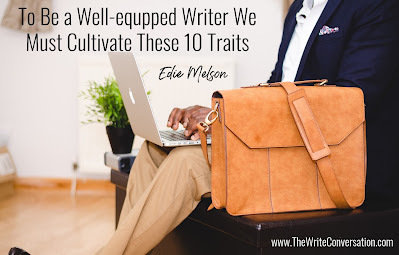
by Edie Melson @EdieMelson
When each of us chooses to label ourselves as a writer, we are embarking on a journey that’s not for the faint of heart. To find joy—and yes, even a little success—we need to make sure we’re well-equipped for what lies before us.
I know many of you who read this blog, and I have to confess I’m thinking of you specifically as I write this. Yes, these are things I’ve tried to cultivate in my writing life—but they’re also things I SEE in your lives.
You are an inspiration to me, to each other and to those around you.
So today I’m sharing what I’ve learned—and what I know will make your journey easier. Developing these characteristics will help you find more joy as you climb to the places God has for you.
10 Traits of Well-equipped Writers
1. We know Who’s really in charge. Those of us who are believers who write must remind ourselves that while we can make plans, it is God Who directs our paths. So often through the years, what I’ve thought was a set-back was actually a short cut to the place I needed to be.
2. We learn to adapt to change. I’ve heard it said more times than I can count that the only constant in the publishing world is change. The ability to adapt when life throws a curve ball is what sets well-equipped writers apart from the rest.
3. We focus on solutions, instead of problems. Writers are creatives. We concoct stories out of thin air and offer commentary on the world that others haven’t considered before. But often times when challenges arise, we forget to look for answers. Instead we focus on what’s gone wrong.
4. We are aware of your own strengths and weaknesses. A well-equipped writer knows what she’s good at and what she needs to work on. You know what you need to get where you want to be.
5. We put rejection in its place quickly. Rejection is part of this business. It hurts, and often times—because publishing is subjective—it’s unfair. To keep going, you’ve learned how to take a little bit of time to rant, and then move beyond the hurt.
6. We learn from mistakes. Not just our own mistakes, but we’re wise enough to learn from those that others make. Truthfully I’ve learned way more from what I’ve done than what I’ve done right.
7. We create a community of people to encourage, support and help us. Putting words on paper—or on a screen—can be a lonely process. The well-equipped writer has surrounded himself with others who are on the same path and together they are stronger.
8. We know how to stay focused when the pressure is on. Instead of throwing in the towel, we double down and do what has to be done. I’ve watched many of you finish books through illness, family issues and loss. You’ve lost contracts, had publishers go out of business, and yet you persevere.
9. We remain connected to the ultimate Creator. We make the time to meet regularly with God. Because of that, our words reflect His light. They illuminate a world that is dark and is in desperate need of hope.
10. We know there is no competition. The Christian writing world is the most generous community I’ve ever imagined being part of. To the rest of the world, it looks like we’re training our competition. But the truth is, there’s more than enough work to go around. We are stronger when we help each other along the path.
These are the things that I’ve discovered make the writing journey joyful and a path I want to explore for the rest of my life. I’d love to know what you’d add to the list!
Don’t forget to join the conversation!Blessings,Edie
TWEETABLETo Be a Well-equpped Writer We Must Cultivate These 10 Traits from @EdieMelson (Click to Tweet)
 Edie Melson is a woman of faith with ink-stained fingers observing life through the lens of her camera. No matter whether she’s talking to writers, entrepreneurs, or readers, her first advice is always “Find your voice, live your story.” As an author, blogger, and speaker she’s encouraged and challenged audiences across the country and around the world. Her numerous books reflect her passion to help others develop the strength of their God-given gifts and apply them to their lives.Connect with her on her website, through Facebook, Twitter and on Instagram.
Edie Melson is a woman of faith with ink-stained fingers observing life through the lens of her camera. No matter whether she’s talking to writers, entrepreneurs, or readers, her first advice is always “Find your voice, live your story.” As an author, blogger, and speaker she’s encouraged and challenged audiences across the country and around the world. Her numerous books reflect her passion to help others develop the strength of their God-given gifts and apply them to their lives.Connect with her on her website, through Facebook, Twitter and on Instagram.
Published on March 25, 2023 22:00
March 24, 2023
The Number One Way for Writers to Ruin Their Story
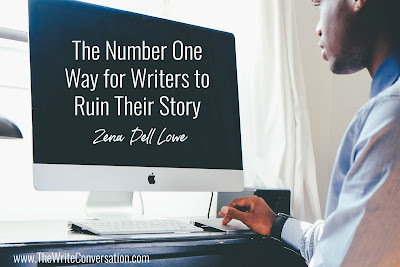
by Zena Dell Lowe @ZenaDellLowe
I keep harping on this idea that we ought to be writing stories with “heroes-in-the-making,” and heroes-in-the-making are characters who possess selflessness from the very beginning. While your MC must grow and change over the course of the story to become the hero they were always meant to be, they still ought to embody the right qualities from the start -- the kind that make them uniquely suited to lead and mark them as different from the other emerging leaders. In other words, the number one quality that readers want to see in a character is selflessness, which means that the number one way for writers to ruin their story is to make their main character selfish.
The number one way to ruin a story is to make the main character selfish.
Think about it. There is nothing likeable about a selfish person. Nothing noble or good. Selfishness is the root of all sorts of sins: bitterness, resentment, jealousy, covetousness, greed, pride, arrogance, selfish ambition and more. The Apostle Paul warns us, “Do nothing out of selfish ambition or vain conceit, but in humility consider others better than yourselves. Each of you should look not only to your own interests, but also to the interests of others” (Phil. 2:3-4).
Instead of being driven by some kind of innately selfish goal (i.e., a desire to get something that only benefits them), heroic characters must be driven to pursue their goal for some kind selfless reason. It seems so simple, and yet so few projects of late have gotten it right. Perhaps we’ve been so influenced by culture that we’re no longer able to discern between selfless and selfish behavior. Whatever the case, I continue to read stories with so-called heroic characters who are not, in fact, heroic, but rather, who possess character qualities that make them fundamentally despicable.
One of the first markers of a “good” or “heroic” person is this determination to look out not only for your own interests, but also for the interests of others. Selfish people are unwilling to do this. They’re incapable of it because all they care about is themselves. Selfishness is a trait that we revile in real life almost above all others. So why on earth do so many writers insist on giving this quality to their main characters?
Writers don’t understand what it means to have a flawed character
The prevalence of the anti-hero archetype in culture has given writers a misguided notion of what it means to construct a flawed character. Most writers equate being “flawed” with being morally defective. Thus, they assign morally heinous traits to their characters, like selfishness, knowing full well it’s “bad,” but which they intend to redeem over the course of the story. The problem is that true selfishness is seldom overcome (in real life or in story) because the selfish person necessarily starts out as evil. We have difficulty admitting this because this trait has become so normalized in culture. Nevertheless, selfishness is evil, which makes it difficult for your character to overcome it in a way that the audience both believes and accepts. There are ways, of course, to accomplish this, which we’ll look at shortly. But first, perhaps we should rethink our notion of what it means to construct a flawed character.
Your character’s flaw is that which trips him up repeatedly
Instead of thinking about the character’s fatal flaw as some kind of moral deficiency, think instead about how your character’s personality traits, even noble ones, trip him up over and over again throughout the story. They keep getting him into trouble, which is why it’s so “fatal”.
For example, in the film Serpico, Al Pacino plays an honest cop who won’t take bribes. He refuses to participate in the department-wide corruption. But nor does he turn his fellows in. Nevertheless, they hate him. He’s ostracized by them. They don’t trust him. And ultimately, they set him up to be killed, all because he’s honest. Serpico’s fatal flaw is not some kind of moral deficiency on his part. It’s his refusal to participate in corruption that ultimately brings him down. As the tag line for the film says, “There’s nothing more dangerous than an honest cop.”
The only antidote to selfishness is humility
The reason there’s nothing desirable about a selfish person is because they lack the one characteristic that could redeem them: humility. It therefore stands to reason that you either make your MC humble from the start, or you cause something to happen over the course of the telling that will radically humble them and cause change.
The Bible talks a lot about being humbled. Humility was the characteristic God looked for when deciding how to deal with His people in the Old Testament. When they sinned against Him, He declared, “If my people, who are called by my name, will humble themselves and pray and seek my face and turn from their wicked ways, then I will hear from heaven, and I will forgive their sin and will heal their land.” Time and time again, God gives us the prescription for redemption. All that’s required is that we humble ourselves.
If you insist on writing a selfish character, then you must do something to bring them to their knees. As it is in real life, the only way to redeem a truly selfish character is to humble them completely.
Characters who only appear selfish must show signs of being at war with themselves.
The only other option is to construct a character who only appears to be selfish. If this is the case, there should be “evidence” of sorts. At the very least, we should see a character at war with himself. This is the character who lives in such a dark world that it’s all men for himself. Perhaps this character continually tries to push people away. You can’t get close to anyone in a world where you might have to leave them behind. But a heroic figure would not be able to wholly do this. Try as they may, they can’t help but to care, and it’s killing them internally.
In other words, we’ll see visible markers of their internal struggle. They want to be selfish, but they are not, in fact, capable of it. If they must leave someone behind, they’re shredded over it. If they witness something horrible or unjust, they’re compelled to act even to their own detriment. If they fail to save that person, it wrecks them. We should see them struggling internally with mounting pressure. As the hard choices and the failures add up, we see them crumbling under the weight of it all. What starts out as simple hesitation quickly becomes depression, agitation, self-loathing, and blossoms into rage. We see them berating themselves in private, snapping at others in public, all because they hate the person they’ve become. They’ll find it increasingly difficult to live with themselves because of the ugly choices they’ve made. They’ll be haunted by these choices and their anger at the establishment will grow. And grow and grow some more, until finally, they can’t take it anymore. They’re finally pushed to the brink. They can’t deny their true nature anymore. If it means death, so be it. But they are no longer going to live this way because it’s wrong, and they must fight, regardless of what it means for them. They make peace with their internal nature and step into the hero they were always meant to become. But it’s not by suddenly becoming selfless where before they were selfish. Rather, they’re throwing off the falseselfishness that they were trying to embody in favor of embracing their true nature at last.
Conclusion
No other trait is more riddled with problems than the characteristic of selfishness. This is the worst possible trait you can give to a character that you want the audience to love. If you can’t create a character who cares about others from the beginning, then be prepared to radically humble your selfish character. Or create a world where selfishness seems to be the only logical way to survive. But then show us a character who can’t live up to that ideal. Who is impacted by the horrors and sufferings she sees, and who’s ultimately compelled to act because she can’t help but to care.
TWEETABLEThe Number One Way for Writers to Ruin Their Story from @ZenaDellLowe on @EdieMelson (Click to Tweet)
 Zena has worked professionally in the entertainment industry for over 20 years as a writer, producer, director, actress, and story consultant. Zena also teaches advanced classes on writing all over the country. As a writer, Zena has won numerous awards for her work. She also has several feature film projects in development through her independent production company, Mission Ranch Films. In addition to her work as a filmmaker, Zena launched The Storyteller’s Mission with Zena Dell Lowe, a podcast designed to serve the whole artist, not just focus on craft. In 2021, Zena launched The Storyteller’s Mission Online Platform, where she offers advanced classes and other key services to writers. Zena loves story and loves to support storytellers. Her passion is to equip artists of all levels to achieve excellence at their craft, so that they will truly have everything they need to change the world for the better through story.
Zena has worked professionally in the entertainment industry for over 20 years as a writer, producer, director, actress, and story consultant. Zena also teaches advanced classes on writing all over the country. As a writer, Zena has won numerous awards for her work. She also has several feature film projects in development through her independent production company, Mission Ranch Films. In addition to her work as a filmmaker, Zena launched The Storyteller’s Mission with Zena Dell Lowe, a podcast designed to serve the whole artist, not just focus on craft. In 2021, Zena launched The Storyteller’s Mission Online Platform, where she offers advanced classes and other key services to writers. Zena loves story and loves to support storytellers. Her passion is to equip artists of all levels to achieve excellence at their craft, so that they will truly have everything they need to change the world for the better through story.To find out more about Zena or her current courses and projects, check out her websites at WWW.MISSIONRANCHFILMS.COM and WWW.THESTORYTELLERSMISSION.COM
Published on March 24, 2023 22:00
March 23, 2023
5 Best Writing Conference Tips for Every Writer

by Lori Hatcher @LoriHatcher2
Conference season is in full swing, and what would be more appropriate than a few tips to make your next writing conference easier, more efficient, and more enjoyable?
I just finished up an amazing weekend at Linda Gilden’s Carolina Christian Writers Conference in Spartanburg, South Carolina and am looking forward to Marilyn Turk’s Blue Lake Christian Writers Conference in Andalusia, Alabama. As I look back on one and forward to the next, I’ve compiled my five best writing conference hacks.
5 Best Writing Conference Hacks
1. Bring a dedicated notebook.
For years I took notes on conference handouts and miscellaneous scraps of paper. When I returned home, I’d shove the notes into a file and never look at them again. All those wonderful words of wisdom virtually wasted.
Then, at the Florida Christian Writers Conference one year, I bought a purple journal that said WRITE on it. I carried it to every workshop and took copious notes. What a joy to have everything in one place.
The next time I attended a conference, I added more wisdom to the notebook. Now, three years and seven conferences later, I have a priceless collection of writing knowledge neatly bound between two covers and easily accessible. Whenever I ask myself, “What was it that plug-in Edie Melson talked about in her workshop?” I go to my purple notebook, flip to the page with her name on it, and VOILA, I have all the information I need.
2. Find a book bag that works for you.
This will vary from conference to conference. If a conference is held somewhere with a mostly flat terrain, like Florida CWC , I use a rolling book bag . The handle folds flat and the small case expands into a full-sized carryon if needed. At the Blue Ridge Mountains Christian Writers Conference , which has hills and stairs, I bring a backpack. I find it much easier to navigate the stairs than with a rolling book bag and much easier to carry than an over-the-shoulder bag.
3. Pack a kit with conference essentials.
My kit contains headache medicine (so many people, so many conversations), Band-Aids for blisters (darn those cute new shoes), snacks (Reese’s peanut butter cups and granola bars), a toothbrush, toothpaste, and floss (no bad breath for important conversations), hand sanitizer (so many handshakes), as well as tissues, contact lens solution, an extra pen, and ChapStick.
4. Buy the conference recordings and spend as much time as you can meeting with people.
I love, love, love writing workshops. I learn something valuable every time I attend one. Conferees often wonder if they should leave a dynamic workshop to meet with an industry professional in a one-on-one appointment. My answer? YES.
Conferences provide rare and invaluable opportunities to meet and gain personal insight from the movers and shakers in the Christian publishing industry. When else could you sit across from an acquisitions editor or agent and share the project God has laid on your heart or ask their advice about the next step in your writing career? I can trace almost every publishing breakthrough back to a one-on-one appointment a writers conference.
Attend as many workshops as you can, but don’t neglect meeting one on one with agents, editors, and faculty members. If you purchase the conference recordings, you won’t miss a workshop. You can listen and learn at home.
5. Begin every conference day with prayer.
My conference day prayer sounds something like this:
Father, you know the plans you have for me today. Help me receive everything that comes from your kind and wise hands. Remind me to be teachable, grateful, and kind. Connect me with the people who can help me become the best writer possible, for your glory. Help me surrender my hopes, dreams, and agenda to you, knowing that you will accomplish your will in my life, in my writing, and in the world. Remind me that editors, agents, faculty members, and conferees are people, too. Show me how I can bless them today. In Jesus’s name I pray, amen.
Writers conferences are one of the most important ways to grow as a writer, advance your career, and discover what God wants to do in and through your writing. I hope these five tips will help you be better prepared to enjoy and learn from your next conference.
Now it’s your turn. What’s your favorite conference tip? Share it in the comments and join the conversations.
TWEETABLE5 Best Writing Conference Tips for Every Writer from @LoriHatcher2 on @EdieMelson (Click to Tweet)
 Lori Hatcher is an author, blogger, writing instructor, women’s ministry speaker, and career dental hygienist. She writes for Our Daily Bread, Guideposts, Revive Our Hearts, and Crosswalk.com. Check out her latest devotional, Refresh Your Hope, 60 Devotions for Trusting God with All Your Heart from Our Daily Bread Publishing. Connect with her at www.LoriHatcher.com or on Facebook, Twitter (@lorihatcher2) or Pinterest (Hungry for God)
Lori Hatcher is an author, blogger, writing instructor, women’s ministry speaker, and career dental hygienist. She writes for Our Daily Bread, Guideposts, Revive Our Hearts, and Crosswalk.com. Check out her latest devotional, Refresh Your Hope, 60 Devotions for Trusting God with All Your Heart from Our Daily Bread Publishing. Connect with her at www.LoriHatcher.com or on Facebook, Twitter (@lorihatcher2) or Pinterest (Hungry for God)Featured Image: Photo by Aaron Burden on Unsplash
Published on March 23, 2023 22:00
March 22, 2023
Failure or Success—Writers Get to Choose How to Look at Circumstances
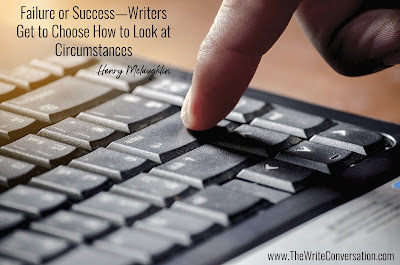
by Henry McLaughlin @RiverBendSagas
Recently, I received a rejection from an agent. One of those non-specific rejections. You know, the ones that say something like “not a good fit for me.” Something about my writing did not strike the agent as worthy of representation or publication. And it added to a string of rejections.
I allowed myself a brief pity party. And then I went to the Lord, asking for direction and strength to continue writing.
I entered a time of prayerful reassessment of who I am and how he bests wants me to serve him. Then I found a blog post from a former pastor in the stewardship ministry at my church.
And I discovered a few things.
One is—it’s unreasonable to think I can achieve success without some failures along the way. Remember learning to ride bike? Or driving a stick shift? Striking out with a cute girl?
Failure can either stop me completely or it can teach me something about who I am and what I’m trying to do.
Failure doesn’t determine my future. Unless I let it. What determines my future is what I do after I fail.
I am not a failure unless I decide to quit and let the failure define me. Before I make this decision, I need to make sure I’m hearing from God and not my self-pity.
4 Things Writers Need to Know About Failure1. Embrace the fact that failure is part of the journey. When something doesn’t work there are often other ways to achieve my goal. Including learning to be better at what I do. The cliché is “back to the drawing board.” 2. Failure is not about me as a person. Failure is the result of an action I took or did not take. 3. Don’t quit. Failure is not a reflection of who I am. Failure is part of life, of growing. We’re all in good company. The only one on this earth who got it right the first time is Jesus.4. I can’t change the past. So move on. Assess, learn, make corrections, and get back to work. Don’t play the role of victim.
Final Thoughts
C.S. Lewis is quoted as saying, “I can’t go back and change the beginning, but I can start where I am and change the ending.”
Failure and rejection do not paralyze us or condemn us. They are tools to teach us to learn and grow and improve. Look at failure as another step forward on the ladder to success. If we let failure stop us, we’re doomed. Learn all you can from the experience. Seek the counsel and wisdom of other writers who will encourage you on your journey. Keep learning and improving.
Start where you are and change the ending.
How do you handle failure?
TWEETABLEFailure or Success—Writers Get to Choose How to Look at Circumstances from author Henry McLaughlin on @EdieMelson (Click to Tweet)
 Henry’s debut novel, Journey to Riverbend, won the 2009 Operation First Novel contest.
Henry’s debut novel, Journey to Riverbend, won the 2009 Operation First Novel contest.Henry edits novels, leads critique groups, and teaches at conferences and workshops. He enjoys mentoring and coaching individual writers.
Connect with Henry on his BLOG, TWITTER and FACEBOOK.
Published on March 22, 2023 22:00
March 21, 2023
The Writer’s Adventure of Using Sensory Perception - Part 1
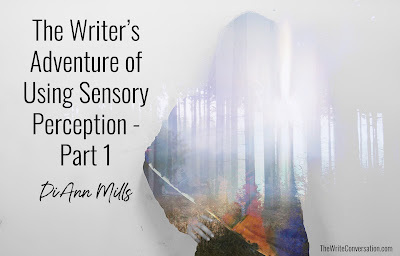
by DiAnn Mills @DiAnnMills
“The beginning of human knowledge is through the senses, and the fiction writer begins where human perception begins.” Flannery O’Connor
Experiencing a scene through the senses pulls in the energy of credibility, but only if the writer uses relational and understandable language that emerges from the real inner character. Emotions are displayed in ways that show the story through a POV character. Our characters differ in culture, memory, role models, education, life history, ethnicity, and personality. Those qualities help determine how to relay emotions—or not —and what motivates the character into action. This is true of how a character participates in a sensory activity.
SightSight isn’t limited to physical vision but dreams, imagination or mental imagery, and the character’s perception of the object—depth, color, and detected light. When we see or form a goal, we have vision, often viewed as hope for the future. Consider a mirage or the phrase: it’s a figment of my imagination.
The character filters what is seen much like looking at light through a prism. Other factors contribute to sight: age, color blindness, mental aptitude, and the health of the eye. What we see or don’t see impairs judgment and a perception of reality. Our characters face the same victories and challenges when they step into their reality.
“Imagination is more important than knowledge. Knowledge is limited. Imagination encircles the world.” Albert Einstein
SoundSounds are soft, loud, shrill, pleasant, unpleasant, or frightening. Sometimes a mixture. Like sight, characters hear through their life filters to interpret and an associated emotion. Writers use the familiar to bring the unique sound to life and provide an opportunity for the reader to feel a kinship.
The gentle tone of a father’s voice sooths a child, but the same words spoken in a harsh tone translate into anger or fear. What does the character hear and what emotional response do they form?
Use caution with onomatopoeia, a means of using a word that imitates the action. Poetry and some fiction benefit from the technique, but it often emphasizes telling instead of showing. A few onomatopoeia words to avoid: slam, crash, bang, pow, wham, splat, buzz, and I think you get the picture. Sometimes the technique works well, as noted in the quote below.
“Some words can also convey feelings without going full-on onomatopoeia. Ooze. Grunt. Scoff. Frumpy. Skittered. They’re not mimicking sounds, but we get a strong sense of their meaning by how they hit our ears.” Janice Hardy
SmellThe sense of smell may be one of our most powerful senses and it’s linked with taste. A writer introduces a woman with a distinct cologne. Whenever the male character notices the smell, he associates it with beauty, charm, and grace. But if the woman shuns him, he comes to despise the scent.
We value the odor of properly prepared food, fragrant flowers, herbs, and other growing plants. Smells can also warn us of danger or potential hazards.
Memory is more closely associated with smell than any of the other senses. Think back to a time when a unique odor triggered a pleasant, unpleasant, or forgotten memory.
A character who has lost their sense of smell suffers physically and mentally. Like us, our characters respond to smell according to personality, preference, and life experiences.
Next month, we will continue the discussion of sensory perception in our writing by exploring touch, taste, and our sixth sense.
My challenge to you is to dig deeper into your character’s life and discover how to show sensory perception. How are you using sight, sound, and the smells in your writing?
TWEETABLEThe Writer’s Adventure of Using Sensory Perception - Part 1 from author @DiAnnMills on @EdieMelson (Click to Tweet)
 DiAnn Mills is a bestselling author who believes her readers should expect an adventure. She creates action-packed, suspense-filled novels to thrill readers. Her titles have appeared on the CBA and ECPA bestseller lists; won two Christy Awards; and been finalists for the RITA, Daphne Du Maurier, Inspirational Readers’ Choice, and Carol award contests.
DiAnn Mills is a bestselling author who believes her readers should expect an adventure. She creates action-packed, suspense-filled novels to thrill readers. Her titles have appeared on the CBA and ECPA bestseller lists; won two Christy Awards; and been finalists for the RITA, Daphne Du Maurier, Inspirational Readers’ Choice, and Carol award contests. She is the former director of the Blue Ridge Mountain Christian Writers Conference, Mountainside Marketing Retreat, and Mountainside Novelist Retreat with social media specialist Edie Melson. Connect here: DiAnnMills.com
Published on March 21, 2023 22:00
March 20, 2023
8 Truths Every Writer Needs to Remember Along the Writing Road

by Edie Melson @EdieMelson
Stephen King once said, “Life isn’t a support system for art. It’s the other way around.”
I'd like to go one step further and add that choosing the writing life isn’t a choice for the faint of heart. If you’re serious about having a career in publishing, you’re going to need some tools to equip yourself for the writing journey. Beyond that, you’re going to have to make some decisions about how you spend your time. I did. And I haven’t regretted a moment of it.
Life is a series of small decisions that link together as a journey toward your goal.
So what is your goal? Do you want to be published, have a career filled with multiple books? Or are you hoping to become a full-time freelance writer or editor? Any of those are going to take time and commitment.
Then you’re going to have to decide right now if you’re willing to pay the price.
8 Truths Every Writer Needs to Remember
1. Writing is done alone . . . by yourself. It’s just not a group activity. You’re going to have to commit to considerable time spent one-on-one with your computer, banging out words.
2. Writers need a team . . . I know I said it’s done alone, but you still need a support system. We live in our heads. Something considered abnormal by the majority of the world’s population. We need people around us who understand the frustration and the exultation that comes with writing.
3. Writing is easy . . . mastering the craft is hard. It takes time and study to do it with excellence. You’ve got to be willing to put in the time.
4. Writers need drive and determination . . . most of all. We need it a whole lot more than they need talent. See the bullet point above. We can master the craft if we work at it. It’s the work-at-it part that’s hardest.
5. Writing is relational . . . It really is who you know. I know, this one may not make me popular, but it’s true none-the-less. In this business, it’s important who you know. You need to be networking, online, locally, and at conferences.
6. Writers need to believe in themselves . . . no matter what. Sometimes an internal sense of I’m on the right path is the only thing that stands between success and failure.
7. Writing is a mind game . . . yes you write alone, I'm not changing #1. But I forgot to mention those voices that take up residence in your head when you make the commitment. You’ll hear things from inside your head like this. This is awful, why do you even bother? or Nobody want to read this, just quit.
8. Writers need to set priorities . . . and then stick with them. If you decide to write every Saturday morning, then do it. It doesn't matter if the house is a wreck before (or after if hubby is in charge of the kiddos). Honor your commitment to yourself!
These are the top eight things I’ve needed for my writing journey. What are some things that you’ve had to bring you success?
Don’t forget to join the conversation!Blessings,Edie
TWEETABLE8 Truths Every Writer Needs to Remember Along the Writing Road from @EdieMelson (Click to Tweet)
 Edie Melson is a woman of faith with ink-stained fingers observing life through the lens of her camera. No matter whether she’s talking to writers, entrepreneurs, or readers, her first advice is always “Find your voice, live your story.” As an author, blogger, and speaker she’s encouraged and challenged audiences across the country and around the world. Her numerous books reflect her passion to help others develop the strength of their God-given gifts and apply them to their lives.Connect with her on her website, through Facebook, Twitter and on Instagram.
Edie Melson is a woman of faith with ink-stained fingers observing life through the lens of her camera. No matter whether she’s talking to writers, entrepreneurs, or readers, her first advice is always “Find your voice, live your story.” As an author, blogger, and speaker she’s encouraged and challenged audiences across the country and around the world. Her numerous books reflect her passion to help others develop the strength of their God-given gifts and apply them to their lives.Connect with her on her website, through Facebook, Twitter and on Instagram.
Published on March 20, 2023 22:00
March 19, 2023
Umbrella Marketing Strategies for Authors
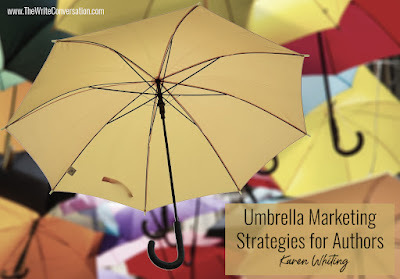
by Karen Whiting @KarenHWhiting
An umbrella is a covering that includes your main and sub-products. As creatives it’s easy to want to branch out and not stay within one niche. But many times editors and agents want us to have a single brand. Look around at businesses including McDonald’s known for its burgers and Campbells known for soup and note that they also sell many other products but stay tied to the umbrella of fast food or wholesome easy to prepare at home. Thus, they have a core message but branch out in what they sell. They maintain a common thread that pulls the products together. Most such companies started with a main product and then, once established, added other products.
With authors, your core message may be peace or overcoming abandonment, but you may do that through fiction, nonfiction, children’s books, and Christian Living books. For myself, I’m all about helping families thrive. My books include ones for women, children, and families, plus I’m on the team of Tim Mahoney’s documentary and film company that produces documentary feature films for adults and youth films to watch as a family. People quickly understand that my goal is to help families bond to one another and God. It takes the right strategies to promote your umbrella of books.
Build on Your Strengths
One important aspect of umbrella branding is to use the author’s best-known book to help launch others. Pam and Bill Farrel’s book Men are Like Waffles, Women are Like Spaghetti, as her top seller, is a great one to pull out a quote to introduce a new book. She has books Bible studies, so she can use book quotes from that flagship book on faith and studying the Word as a couple. She has books on joy, and can use the book’s quotes about joy to launch those books.
Search your best-seller to find quotes related to the topic or massage of your newer books. You may think, “But I’m switching to a children’s book, so how does that help?” Remember that the parents, especially the mom, still buys the books for children, so those quotes target the buyer. You might add to a post, if your main topic is marriage, “Joy makes a difference in your marriage and can also make a difference for your child.” I used bookmarks for my books for girls that sold so well, and brought some of the ideas in those bookmarks when I wrote a parenting book. The cross promotion with a little connection helps the mom/buyer see your values are the same in your other books.
Segment the Audience
Consider various lines of books as audience segments that provide a unique benefit for that segment. So your audience may be moms, but some may want help with organizing their home and day while others want help communicating with their teens or they may have different aged children. You can use a quiz to divide your audience, and website visitors, according to their needs. Match the products that best suit each audience and create email sequences and messages best suited for each.
The segmenting allows you to email the ones most interested in your next book to receive the first emails about it. Later, as that audience starts to buy, you can tap into the entire email list for a blast where you connect your values that underscores all your books to promote to everyone, and use a quote form a read about the new book.
Know Your Common Thread
Campbell’s uses words like delicious, simple, well-crafted, and foods you love. They build on people trusting their food, so they showcase the nutrition and affordability of the products. They share the benefits continually, and that makes it easier to introduce new products.
Identify the common thread or core message in your writing. If you write fiction and nonfiction, you likely have a core message such as hope, belonging, or family. Be sure to post often about that core message.
If you always bring hope, then use quotes on hope, share from a reader’s perspective how hope you gave helped, and give them tips on hope. Also leader with your best-selling books people know to inspire them to tread other books. Thus, ‘If you love [ABC], you’ll find the same (quality value in that book] in this new book XYZ.
Use Some Visuals
Take photos with your best sellers and your newer books, or divide books if you have a lot, into categories and take a photo. You might even get a rainbow umbrella and write words that tie the books together or add iron on photos of your covers and snap a shot. Use a logo that expresses your values rather than one book. That makes you the brand and helps people associate what they like about your writing that they can expect in any title under your umbrella.
It’s easier to start out with one book, build it up with similar books first, and then branch out as you articulate your umbrella’s core message and share how it flows from your early books.
TWEETABLEUmbrella Marketing Strategies for Authors from author @KarenHWhiting on @EdieMelson (Click to Tweet)
 Karen Whiting (WWW.KARENWHITING.COM) is an international speaker, former television host of Puppets on Parade, certified writing and marketing coach, and award-winning author of twenty-seven books for women, children, and families. Her newest book, The Gift of Bread: Recipes for the Heart and the Table reflects her passion for bread and growing up helping at her grandparent’s restaurant. Check out her newest book Growing a Mother’s Heart: Devotions of Faith, Hope, and Love from Mothers Past, Present, and Future. It's full of heartwarming and teary-eyed stories of moms.
Karen Whiting (WWW.KARENWHITING.COM) is an international speaker, former television host of Puppets on Parade, certified writing and marketing coach, and award-winning author of twenty-seven books for women, children, and families. Her newest book, The Gift of Bread: Recipes for the Heart and the Table reflects her passion for bread and growing up helping at her grandparent’s restaurant. Check out her newest book Growing a Mother’s Heart: Devotions of Faith, Hope, and Love from Mothers Past, Present, and Future. It's full of heartwarming and teary-eyed stories of moms.Karen has a heart to grow tomorrow’s wholesome families today. She has written more than eight hundred articles for more than sixty publications and loves to let creativity splash over the pages of what she writes. She writes for Crosswalk. Connect with Karen on Twitter @KarenHWhiting Pinterest KarenWhiting FB KarenHWhiting.
Published on March 19, 2023 22:00



